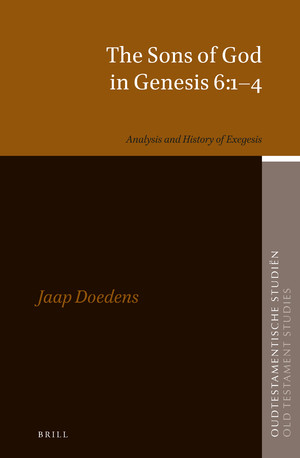Artigo e livro sobre um texto difícil do Antigo Testamento: Gn 6, 1-4.
Um artigo:
Those Elusive Sons of God: Genesis 6:1–4 Revisited – By Jaap Doedens – The Bible and Interpretation – April 2019
Desde o início do século XX, e especialmente após as numerosas descobertas de expressões semelhantes em textos extrabíblicos, a exegese dominante voltou a uma interpretação “sobre-humana” dos “filhos de Deus” em Gn 6,1-4. No entanto, agora eles não são vistos como anjos (caídos), mas como “seres divinos”, ou divindades (…) Esta solução exegética mais recente é provavelmente a correta.
É possível descobrir o cerne histórico desta narrativa sobre casamentos de seres divinos e mulheres humanas que resultaram no nascimento de heróis gigantes? A origem desta narrativa talvez possa estar ligada à presença de túmulos megalíticos, principalmente na região da Transjordânia, os chamados dólmens, datados de finais do terceiro e início do segundo milênio a.C. É razoável que, devido ao seu tamanho, essas estruturas monumentais deram origem a histórias sobre gigantescos guerreiros caídos. De alguma forma, um destes contos entrou na narrativa bíblica e tornou-se parte de uma estrutura teológica que elucida o destino da humanidade com todas as suas tentativas e erros.
Since the beginning of the 20th century, and especially after the numerous discoveries of similar expressions in extrabiblical texts, mainstream exegesis returned to a ‘superhuman’ interpretation of the ‘sons of God’ in Gen 6:1–4. Yet now they were not viewed as (fallen) angels, but as ‘divine beings’, or deities (…) This newer exegetical solution is most probably the correct one.
Is it possible to discover an historical kernel of this narrative about marriages of divine beings and human women resulting in the birth of giant heroes? The origin of this narrative could perhaps be connected with the presence of megalithic tombs, mainly in the Transjordan region, the so called dolmens, dating from the end of the third and the beginning of the second millennium BCE. It is reasonable that, because of their mere size, these monumental structures gave rise to tales about giant fallen warriors. Somehow, one of these tales made its way into the biblical narrative, and became part of a theological framework elucidating humanity’s fate with all its trial and error.
Um livro:
DOEDENS, J. The Sons of God in Genesis 6:1–4: Analysis and History of Exegesis. Leiden: Brill, 2019, 372 p. – ISBN 9789004284265.
Em Os Filhos de Deus em Gênesis 6,1-4, Jaap Doedens oferece uma visão geral da história da exegese do texto enigmático sobre os “filhos de Deus”, as “filhas dos homens” e os “gigantes”.
Primeiro, ele analisa o texto de Gênesis 6,1–4. Posteriormente, ele acompanha as diferentes propostas exegéticas desde as análises mais antigas até as dos tempos modernos. Ele ainda fornece ao leitor uma avaliação do significado da expressão “filhos de Deus” no Antigo Testamento e no Antigo Oriente Médio. No último capítulo, ele se concentra na mensagem e na função de Gênesis 6,1–4.
Este volume reúne de forma abrangente tentativas exegéticas antigas e modernas, fornecendo os meios para um diálogo contínuo sobre esta passagem bastante complexa e evasiva.
In The Sons of God in Genesis 6:1–4, Jaap Doedens offers an overview of the history of exegesis of the enigmatic text about the ‘sons of God’, the ‘daughters of men’, and the ‘giants’. First, he analyzes the text of Gen 6:1–4. Subsequently, he tracks the different exegetical proposals from the earliest exegesis until those of modern times. He further provides the reader with an evaluation of the meaning of the expression ‘sons of God’ in the Old Testament and the Ancient Near East. In the last chapter, he concentrates on the message and function of Gen 6:1–4. This volume comprehensively gathers ancient and modern exegetical attempts, providing the means for an ongoing dialogue about this essentially complex and elusive passage.
Sumário
Acknowledgments
Abbreviations
1 Setting the Course: Introduction
1 From Boulder to Keystone to Stumbling Block
2 The Mainstream Solutions
3 Approach
2 A Quest for Meaning: Analyzing Genesis 6:1–4
1 Introduction
2 Lexical and Grammatical Analysis of Genesis 6:1
3 Lexical and Grammatical Analysis of Genesis 6:2
4 Lexical and Grammatical Analysis of Genesis 6:3
5 Lexical and Grammatical Analysis of Genesis 6:4
6 Content and Context: General Observations Relating to Genesis 6:1–4
7 Dramatis Personae: Provisional Conclusions Related to Genesis 6:1–4
3 Trodden Paths: History of Exegesis of the Expression ‘Sons of God’
1 Introduction
2 The Ancient Versions
3 Philo of Alexandria
4 Flavius Josephus
5 Apocrypha and Pseudepigrapha
6 Dead Sea Scrolls
7 Rabbinic Tradition
8 New Testament
9 The Church Fathers
10 Late Middle Ages and Reformation
11 Newer Exegesis
12 Conclusions to the History of Exegesis
4 At the Crossroads: Weighing Exegetical Solutions
1 Introduction
2 The Heavenly Category: ‘Sons of God’ Interpreted as Angels
3 The Social Category: ‘Sons of God’ Interpreted as Mighty-Ones
4 The Religious Category: ‘Sons of God’ Interpreted as Sethites
5 The Mythological Category: ‘Sons of God’ Interpreted as Divine Beings
6 Minor Variants and Combinations
7 Conclusions
5 Perspectives: The Functions of Genesis 6:1–4
1 Introduction
2 ‘Sons of God’ and Biblical Monotheism
3 Genesis 6:1–4 and Myth in the Old Testament
4 Truth Claim and Functions of Genesis 6:1–4
5 Final Observations
Bibliography
Index of Ancient Sources
Jaap Doedens, Ph.D. Kampen Theological University (2013), Pápa Reformed Theological Seminary, Pápa, Hungary, is college associate professor at the latter seminary. He has published articles on the Old Testament, the intertestamental period, and the New Testament in English, Dutch, and Hungarian
Leia mais sobre Gn 6,1-4 em Remnant of Giants.

